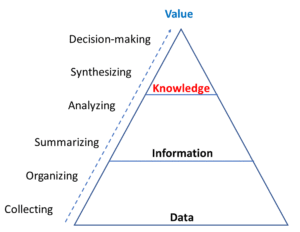Knowledge management vs information
“Knowledge is information that changes something or somebody—either by becoming grounds for action or by enabling more effective action.” — Peter F. Drucker

Knowledge, information, and data are interconnected but distinct concepts. While the terms “information” and “knowledge” are often used interchangeably, their management requires different approaches. Information management focuses on gathering, organising, and delivering information to decision-makers. In contrast, knowledge management (KM) centres on creating, sharing, and leveraging knowledge to enable learning and action among stakeholders such as scientists, communities, resource managers, and policymakers.
Effective KM plays a critical role in supporting sustainable development by fostering collaboration, co-learning, and adaptive decision-making. This page provides key resources and frameworks for understanding and implementing KM, with links to related topics on this website, including co-production, organisational learning, conceptual modelling, and participatory modelling.
Knowledge management and sustainable entrepreneurship
This 2024 paper by Alawamleh et al. analyzes the evolution of knowledge management research in sustainable entrepreneurship, identifying key trends and concepts. The study reveals interconnected themes such as social entrepreneurship, sustainable development, dynamic capability, and innovation, demonstrating the multidisciplinary nature of this field. The analysis highlights sustainability management, sustainable growth, and sustainable entrepreneurship as the most prevalent themes, indicating the direction of future research and practice in this area.
Knowledge management – from bottleneck to success factor
This 2020 publication by Gianluca Colombo outlines a framework for designing and implementing KM systems in international development. It emphasises co-learning, collaborative knowledge work, and achieving better project outcomes.
Calling for a new agenda for conservation science to create evidence-informed policy
David Christian Rose et al. (2019) argue that conservation faces barriers like limited political priority and weak engagement between scientists and decision-makers. The paper highlights the need to focus on overcoming implementation challenges to bridge science-policy gaps.
A typology of barriers and enablers of scientific evidence use in conservation practice
Jessica Walsh et al. (2019) present a taxonomy of organisational structures, cultures, and relationships that facilitate or hinder evidence use. This serves as a guide to strengthening the science-practice interface.
A roadmap for knowledge exchange and mobilization research in conservation and natural resource management
Vivien Nguyen et al. (2016) propose a framework for integrating knowledge exchange into conservation and resource management. It highlights how rapid environmental changes demand improved knowledge mobilisation for sustainable practices.
What is KM? Knowledge management explained
Michael E. D. Koenig (2018) reminds us that KM’s central aim is capturing and sharing the tacit knowledge within organisations to make it accessible and actionable. The article traces the origins of KM to the late 1980s, when management consulting firms recognised the value of intranets and tools like expertise locators and best practice databases for improving organisational knowledge sharing and decision-making.
Why Knowledge Management Is Important To The Success Of Your Company
This short 2012 Forbes article by Lisa Quast highlights the importance of knowledge management in business, and the costs of not investing in it. Actively managing knowledge can help companies increase their chances of success by facilitating decision-making, building learning environments by making learning routine, and stimulating cultural change and innovation.
ABC of knowledge management
This 2005 report by Caroline De Brún offers a solid foundation in knowledge management (KM), covering key concepts, principles, and practical guidance. While some technological aspects may have evolved, its core insights into effective knowledge sharing and organisational learning remain highly relevant today. It serves as a useful starting point for those seeking to understand and apply KM in their work.
Knowledge management is closely linked to other essential areas, such as organisational learning and conceptual modelling and participatory modelling. These topics explore how organisations adapt to uncertainty and how modelling supports collaborative understanding of complex systems.